Counterfeit vodka kashrut, tahini from Shechem: Kashrut update
Important kashrut updates from the National Kashrut Department of the Chief Rabbinate of Israel. This is the department's first update for the Hebrew year 5776
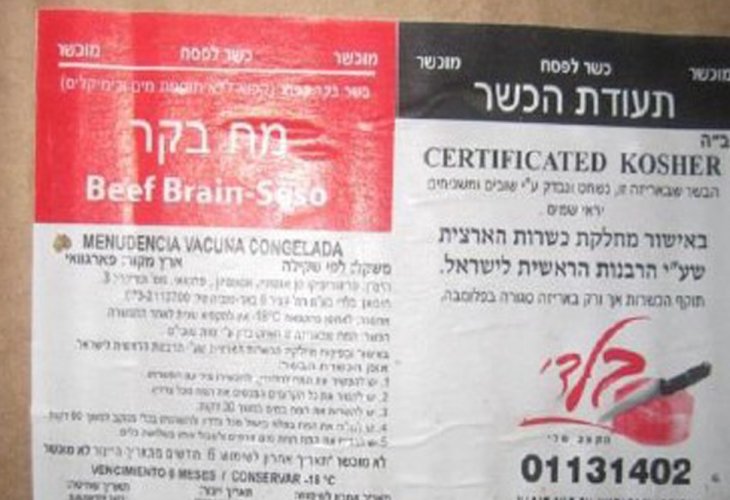
1. Raid on vodka factory with counterfeit kashrut. In a raid conducted by the National Unit for Enforcement of the Prohibition of Kashrut Fraud in cooperation with other enforcement bodies including Israel Police, Ministry of Health, and various economic units - in the industrial area of Rehovot, a factory producing "Sabrov Vodka" was found operating while presenting the bottles as kosher under the supervision of the Rishon LeZion Rabbinate and Badatz Beit Yosef. There is no kashrut supervision at the location and no information regarding the kashrut of the products and production processes. The public should be aware and cautious. These products should not be accepted in supervised establishments.
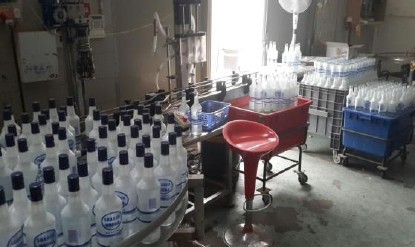
2. Distribution of meat with counterfeit kashrut. Recently, various meat products were found being distributed in white cartons under the brand "Atias Delicacies" which state they are produced by "G.H.S Meat Quality" in Haifa for "Atias Delicacies" butcher shop in Beer Sheva under the supervision of the Haifa Local Rabbinate. Although the label explicitly states that the products must bear a hologram, the products were caught being distributed without any hologram. The Kashrut Department of the Haifa Rabbinate announced that products from "G.H.S Meat Quality" manufactured for brands of other companies must bear a hologram on the label placed on each piece (wrapped in plastic) inside the carton, and without it, they take no responsibility for the kashrut of the product. Additionally, they do not use white cartons at all, only brown cartons, and therefore the kashrut marking on these products is counterfeit! These products should not be accepted in supervised establishments, and any place where they are found should be reported to us immediately. In places where these products have been used, a rabbi should be consulted regarding the need and method for kashering the utensils.
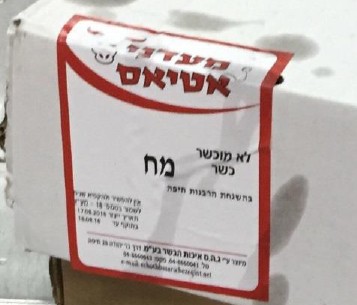
3. Caution when receiving Pigling drink. During an inspection by a national unit inspector, a series of "Pigling" liqueurs in various flavors were found being marketed, some with kosher markings and some without. Review of the import approval reveals that not all flavors received approval from the Chief Rabbinate. Supervisors are called to verify that all products have valid kashrut certification and not to rely on the brand being known as kosher, etc.
4. Contradictory kashrut markings on brain - soaked/not soaked. During an inspection by a national unit inspector, contradictory kashrut markings were found on a carton of imported beef brain by the importer Baladi. On the carton label, one place indicated the meat was "soaked" while another stated "not soaked," while the labels attached to the pieces of meat indicated the meat was not soaked. The import company was updated about the error and called to collect the merchandise with the misleading text. This merchandise should be returned to the supplier for relabeling. The meat in the package is not soaked and should be treated as such. In cases where it was used without soaking, consult with the local rabbi regarding how to kasher the utensils.
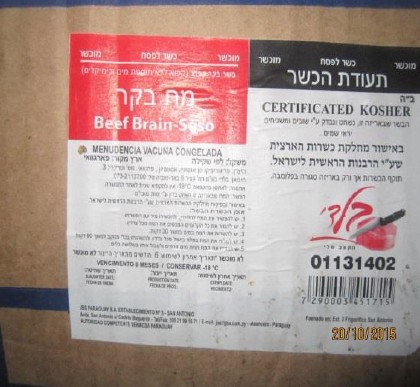
5. Unapproved imported products in Osher Ad branches. During inspections conducted by national unit inspectors at the Osher Ad chain, many imported products were found presented as kosher without the approval of the Chief Rabbinate of Israel. Among others, dried prunes produced by "Kirkland" and imported by Omar Shira Ltd. from Givat Shmuel for Osher Ad, presented as kosher under OU supervision, without the approval of the Chief Rabbinate of Israel. Various types of Nature Valley snacks, produced by General Mills and imported by Omar Shira Ltd. for Osher Ad, presented as kosher under OU supervision or under the supervision of Badatz Agudas Yisrael without the approval of the Chief Rabbinate of Israel. A package of salted macadamia nuts produced by "Kirkland Signature", USA, imported by Omar Shira Ltd. for Osher Ad, presented as kosher under OU supervision, without the approval of the Chief Rabbinate of Israel. Supervisors are called to verify that all products bear kashrut markings as required by law and have valid approval from the Import Department of the Chief Rabbinate of Israel. The products should be removed from the shelves and returned to the supplier.

6. Tahini from Shechem with fake kashrut. During inspections conducted by national unit inspectors, the product 100% pure raw sesame tahini under the "Dove" brand produced by Sadek Abd al-Rahman from Shechem was found being marketed as kosher under the supervision of Chug Chatam Sofer Petach Tikva and with the approval of the Chief Rabbinate of Israel. The product is marketed both in home packages of 1 kg or 0.5 kg and in institutional packages of 17 kg. The product did not receive approval from the Chief Rabbinate of Israel and should not be accepted in supervised establishments. In some packages, the kashrut marking appears on a separate sticker that includes only the kashrut marking without the product name and manufacturer, in a manner not approved by the Chief Rabbinate. We remind that supervisors in supervised businesses are called to accept only products with valid kashrut certification as required by law.
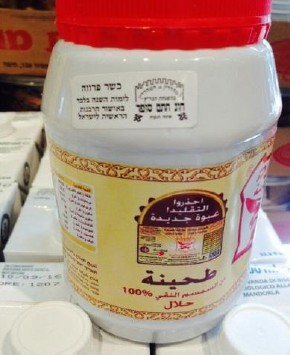
7. Unapproved artichoke hearts. During an inspection by a national unit inspector in a business supervised by a local rabbinate, it was found that the business received artichoke heart quarters contrary to protocol. We would like to remind that according to the Chief Rabbinate's protocols, various types of artichoke hearts should not be used in supervised establishments due to concerns about insect infestation. The kashrut marking on the product was on a separate sticker that included only the kashrut marking without the product and manufacturer details. It should be emphasized that in general, the kashrut marking must be on the original product packaging. In case a sticker is used, the sticker must include all product details, manufacturer name, importer name, the kashrut authority abroad, and the approval of the Chief Rabbinate of Israel. Use of partial stickers should not be approved.
8. Kashrut fraud at Pizza Patzatz - this notice refers only to the Bat Hefer and Lehavot Haviva branches. During inspections conducted by a national unit inspector, it was found that the Pizza Patzatz branches in Bat Hefer and Lehavot Haviva are presented as kosher without having legal kashrut certification. Measures have been taken against the business owner. The public should be aware and cautious.
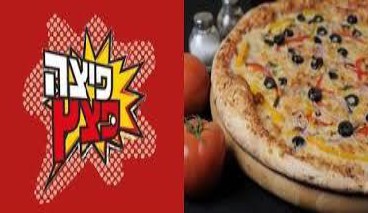
9. Kashrut fraud at IKEA Netanya complex. During an inspection by a national unit inspector, it was found that in the IKEA complex in Netanya, there are restaurants presented as kosher through various means without having kashrut certification from the authorized local rabbinate, Netanya, so it has no responsibility regarding the kashrut status at the location despite the various certificates displayed there. The public should be aware and cautious.
10. Counterfeiting of Jacobs coffee kashrut. During an inspection by a national unit inspector, Jacobs coffee was found being marketed with a cardboard attachment to the lid containing a packet of flavored drink mix as an addition without kosher certification, barcode 7290011967451, produced by Mondelez Deutschland Production GmbH, Germany, imported by Shem Tov Food Ltd. from Holon, presented as kosher under the supervision of Chug Chatam Sofer B'nei Brak and with the approval of the Chief Rabbinate of Israel. An inquiry with the National Import Department found that the product did not receive the department's approval and there is a real concern about the kashrut of the additive accompanying the coffee. This product should not be accepted from this importer in supervised establishments and should be removed from the shelves. The product was found being marketed in the Osher Ad chain and other places. Please update if the product is found anywhere. It should be noted that the importer did not receive approval from the Import Department, even for imports without the additive.
11. Olive presses without supervision. Rabbi Yosef Shalush, Regional Rabbi of South Sharon, announces that he does not provide kashrut certification to the Shamna factory in Moshav Hagor. Additionally, the Industry and Manufacturing Department of the Chief Rabbinate reports that the olive press in Iksal does not have legal kashrut certification from the authorized rabbinate.
12. Daroma honey without legal kashrut. Recently, pure bee honey under the Daroma brand, packaged and filled by "Nachalat Reuven" from Moshav Beit Oved, tel. 08-9403296 , was found being marketed as kosher for Passover under the supervision of Badatz Edah HaChareidit. The producer did not receive kashrut certification from the authorized local rabbinate, and therefore this product should not be accepted in supervised establishments.
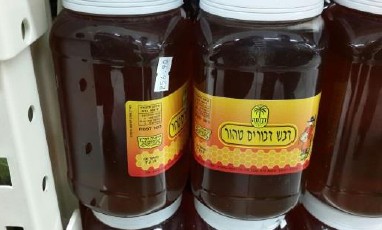
13. Kashrut forgery in drink mix addition. During an inspection conducted by a national unit inspector, "a mixture to be added to drinks strawberry daiquiri " under the brand mr.cs produced by Kelson Industries, USA and imported by Yatzun Valerie from Hadera, was found presented as kosher pareve under the supervision of OK. The kashrut marking was found on a separate sticker from the product label. According to the OK kashrut authority, the product and importer are not under their supervision. Additionally, the product did not receive approval from the Import Department of the Chief Rabbinate of Israel. This product should not be accepted in supervised establishments.
14. Removal of kashrut from P.T. Green and Fresh Leaves. The Regional Rabbinate of Lev HaSharon reports that kashrut certification has been removed from P.T. Green Leaves, which produces and markets supervised leafy greens grown with special methods. Products from this company should not be accepted in supervised establishments.
15. Premium Meats Yavne – Kashrut fraud. During an inspection conducted by a national unit inspector, the business "Premium Meats – Boutique Shop for People Who Understand Meat" located in Yavne was found presenting itself as kosher in various advertisements despite not having legal kashrut certification. The public should be aware and cautious!
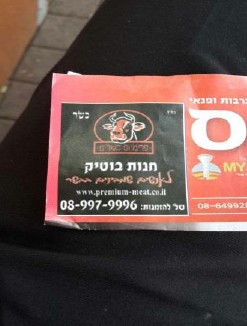
16. Raya Pitas from Peki'in – without legal kashrut. During an inspection conducted by a national unit inspector, it was found that the Raya Pitas business from Peki'in presents itself as kosher under the supervision of Rabbi David Peretz, Rabbi of New Peki'in. The authorized kashrut provider for the location where the business is situated is the "National Kashrut Rabbinate" only. The business owner was asked to contact the authorized kashrut provider but continues to present himself as kosher despite not receiving kashrut certification from the authorized body. Additionally, Peki'in Hotel, also located in Peki'in, is presented as kosher without having legal kashrut certification.
17. Kashrut arrangement – Cooking spray. The National Unit offices received an update that kashrut has been arranged for the product "Canola Oil Spray" and "Olive Oil Spray" produced by Paul Phil from the USA and imported by Shemen Industries from Haifa, after previously being updated that the product had not received approval from the Chief Rabbinate of Israel.
Fruit and Vegetable Kashrut Update
This season there is an infestation (more than usual) in dry food, such as peeled nuts, sunflower seeds, and more, and they should be carefully checked in two stages: a. Sifting - shake in a strainer with relatively large holes (so that the nuts don't fall through) and examine what falls through for insects. b. Inspection - sunflower seeds should be spread on a white surface and checked between them. Walnuts should be checked on both sides on the palms of the hands. If insects are found, it's advisable not to use the product.
Additionally, there are flesh flies (large flies in black or metallic blue/green color) that lay eggs or larvae on any food of animal origin, such as: meat, fish, and eggs, and therefore these products should be well covered, both cooked and uncooked.

